Annual Review 2021-22

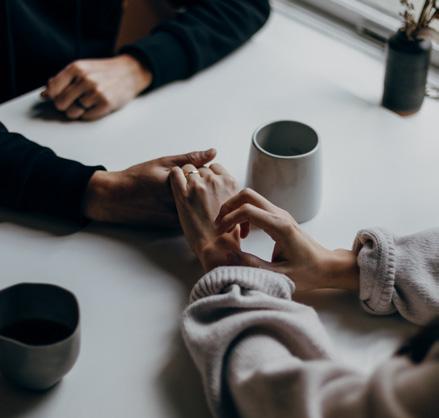
f /ManchesterMind l @ManchesterMind i @manchester_mind
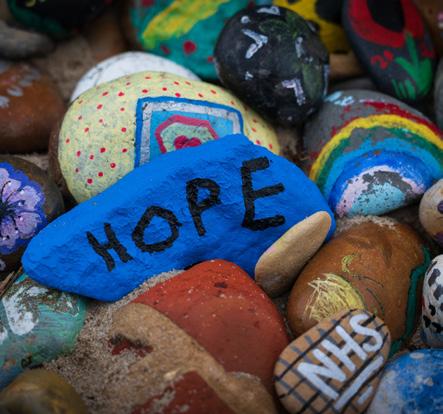
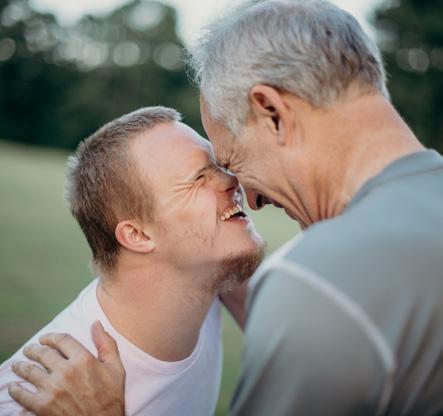



2 Annual Review 2021-22 Welcome 4 Allotment Project 6 Food For All 8 Manchester Volunteer Advice Partnership (MVAP) 9 Advice 10 Fundraising 12 Marketing and Communications 14 Children and Young People’s Service (CYP) 16 Peer Support 18 Training 20 Community Engagement Team 22 Behind the Scenes 24 Contents
Small changes make a big difference!
7795 people in contact with Manchester Mind
331 people supported in accessing physical health checks
1908 people accessed advice

3115 people contacted us through our telephone line
£1.65m was generated in additional income for advice clients
53 volunteers
168 peer support sessions for young people and adults
2,460 volunteer hours were contributed
115 free courses delivered
840 counselling sessions
82 people supported with their discharge from Community Mental Health Teams (CMHT)
1282 Mental Health Practitioner appointments in schools
337 new supporters signed up to fundraise, together with over 50 businesses
Annual Review 2021-22
Welcome to our Annual Review 2021/22
It is hard to believe that just a year ago we were still amidst the restrictions brought about as the response to the Covid-19 pandemic. But we were, and for much of 2021/22 were still coping with lockdowns or partial restrictions and then just as things were being lifted, Omicron struck near to the end of 2021. It felt like here we go again with more uncertainty, both about the present and the future, and how we would manage both the organisation and the shape of the services we would provide. Moving through 2022, we have slowly shifted back to more normality, but only then to be hit by a cost of living crisis, which is going to hit hardest the communities most affected by Covid-19 and the previous 10 or so years of austerity. This means for mental health services we are seeing more need for services with more complexity, and what feels like less room for manoeuvre.
2021/22 was the year we started moving back into the offices and getting to grips with what hybrid working would look like and how it would be managed. Those services that hadn’t delivered faceto-face, started to and we also began to assess how our services would be delivered in the future.

4 Annual Review 2021-22
At this stage there was no certainty that we would return to “normal”.
We began some new services, strengthened the delivery of others and our systems and reporting improved. This was no mean feat when we also consider the uncertainty that was around for everyone.

We would like to thank all our staff and volunteers for their determination , perseverance, patience and kindness. Without them and their approach we could not do anything. We would also like to thank our funders and the people and businesses that continue to fundraise for us. You are all very kind, you give up your time and often take on physically demanding challenges - we appreciate what you do to allow us to do what we do.
It feels hard to escape the big stuff – Covid-19, climate change, the cost of living crisis and so on – but that is what we are going to try and do in this report – not because they aren’t important – we know they are and they have a huge impact on people’s lives. We also know that change and difference often comes by focusing on the things we have control of and can influence. For us that is our approach, which is built on our values and beliefs.
For example, £1.65 million generated by our Advice Team in additional income for people is a big number and makes a huge difference in our communities, but it is made up of a hundred small actions; such as ensuring that appointments are accessible, letting a person tell their story and hearing it, and taking the time to push for additional evidence, putting in extra appointments so that someone will feel less nervous about their up and coming appeal, or gently supporting someone to go to their GP.
So, what follows are some of the stories of the small, and not so small, steps which make up our year. The year 2021/22.
Elizabeth Simpson, CEO Rachel Pearson, Chair of Trustees
5 Annual Review 2021-22
We are looking more at the little things – because when they mount up – they start to make a real difference and it is something we can all do.
Allotment Project
For the people that come to the allotment for mental health support – small acts of kindness, small contributions to the space, and gentle support rather than a major intervention brings about great change.
People often arrive anxious, feeling low and isolated, so our starting point is with grounding and encouraging people to notice and focus on the small things - the feeling of the fuzzy plants in our sensory garden, the smell of our lemon balm, the bees, butterflies and the buds appearing on our flowers – this is an effective way to relax the mind and body, to connect with the space and encourage interest. Then we share the purpose of our space – to grow food and sustain our food projects - and we thank people for coming because everything they do whilst with us, will positively impact the result –the growing of food which contributes to the 23,797 meals and recipe bags produced during the year.
People leave us feeling better. They tell us that they have a greater sense of purpose, improved wellbeing and often go on to try our other activities, or become volunteers because they have not only passively enjoyed our garden, but they have actively contributed to our charity’s work.
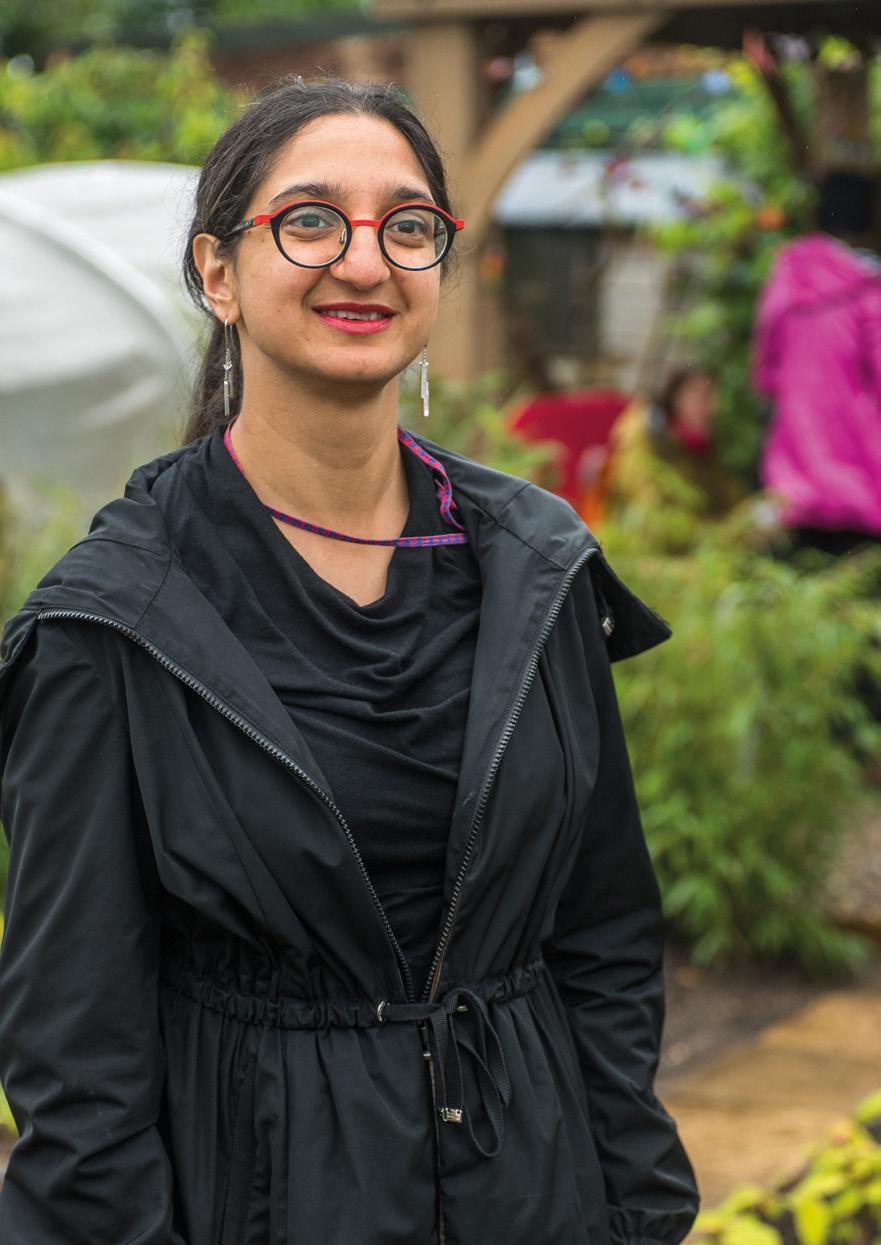
6 Annual Review 2020-21
Everyone who attends the allotment has a small stake in the garden’s outcome and that is an integral part of the difference we make.
“The allotment project’s focus is all about small things”
Without each volunteer and each person – the allotment, our food supply and our food projects would not exist at all.
Callum’s experiences of the connection with our Food For All Team sums it up.

Callum supported the Breakfast Project during the pandemic and then the food team over Christmas. He is now an allotment volunteer. He is a chef, a carer for his mum and grew up in the care system. He struggles to manage stress and worry and he comes to the allotment to relax.
Callum has learned lots of new skills at the plot and led activities at an event. He is currently being supported to complete a carer’s assessment and explore opportunities to change career.
7 Annual Review 2021-22
“It is like a little oasis in the city, everyone is so quiet and laid back. I have met really kind, helpful people and I feel like I am building a network. Growing up I was expected to talk to people I had just met about really difficult stuff. At the allotment, you don’t have to talk about anything but the people there are open and you build up trust, so I know I could talk to them if I needed to.”
Food For All
The Food For All Team have also offered recipe kits to people – they are planned and put together by our chefs Nima, Dionne and Verity. The kits contain all the ingredients and instructions for how to cook a simple, healthy meal. The idea is to help people to develop the confidence to cook healthily for themselves and their family. This idea emerged from people who told us that they enjoyed the ready to heat meals and would also like to cook for themselves but didn’t know where to start.
Most people report that using the kits improves their cooking confidence and gets them back into a routine of preparing food from fresh.
One person commented that the help they had received was supporting their recovery: “I would like to thank Manchester Mind, supporting me with all these little acts is making me believe I am getting better”

The simple act of cooking a meal for yourself, can be a huge step and contribute to improved mental health.

Annual Review 2021-22 8
“The service is amazing you are all so polite, I like that you don’t ring my buzzer because it sets off my PTSD and that you phone instead.”
“ the recipe kits gave me a confidence boost because I have not cooked in a long time.”
“my confidence has increased, it has benefitted my cooking skills and my mental health”
“making the easy recipes gave me something to focus on so were very good for my mental health”
Manchester Volunteer Advice Project

Working in partnership and sharing time and resources can lead to bigger outcomes…
Manchester Volunteer Advice Partnership (MVAP) is one such project. One of the real joys emerging from the pandemic was the new funding from the National Lottery Community Fund for the refreshed MVAP project. It was lovely to start to work with volunteers and our partners Cheetham Hill Advice Centre, Manchester Refugee and Support Network (MRSN) and Greater Manchester Immigration Aid Unit, again.
Working together means that we can recruit and train more volunteers – not just for our own organisations, but across the voluntary, community and social enterprise (VCSE) sector in Manchester. This makes such a difference. Through advice volunteering you learn lots of different skills and with advice volunteers the city is much better resourced to meet the advice needs of local communities.
The team celebrated with the first volunteers at an award ceremony. As we have been deprived of so many chances to meet over the last couple of years, there was a great vibe. The team shared food and stories, enjoying the company. One of our volunteers let us know that the place he works at, selling cakes, had put £100 behind the counter for MVAP volunteers. Another volunteer said that “people often come into MRSN looking worried, but they always leave with a smile”.
9
Advice
Our MVAP partnership links directly into our advice work, which we see as an essential part of our services – it always was and still is.

We are trying to bring a trauma-informed approach to everything we do: this includes advice. The benefit, debt, and housing problems people bring to us have often exacerbated their mental health problems. This means that we sometimes need to spend time to allow people to feel safe enough to tell us their story or at least the bits that are relevant to the advice process – it isn’t always an easy or comfortable thing to do, so we need to respect this and give people time.
One of our advice workers spoke to someone whose first words were “you will give up on this case in the end, no one ever sticks with me, I’m too hard to work with.” She explained that she struggled to engage consistently and other agencies just wouldn’t help her. Although she struggled to maintain contact with us, the small gestures of persistence really meant a lot to her. At the end they sent a text that said “you’ve shown me that some organisations do care about mental health”.
Annual Review 2021-22 10
“I feel that mental health issues and financial difficulties go hand in hand. People like Lisa (Advice Worker) are integral in the journey of stability and recovery”
Manchester Mind has advice workers on in-patient units and within Community Mental Health Teams, in our Children and Young People’s service and they all deal with issues that can be simple through to complex but all involve listening and identifying what the main issue is for a person….

Salwa’s story...
Salwa is receiving support from the community mental health team and she has a diagnosis of severe depression with psychotic episodes. Part of what she experiences is a great deal of anxiety, paranoia, confusion, thought disorder, agitation, and feelings of distress, along with other symptoms.
Salwa was living in temporary accommodation provided by Manchester City Council (MCC), following a successful homeless application. At a point before she was referred to our advice worker she had received a ‘part VI’ accommodation offer by MCC. This is an offer of permanent accommodation in the social housing sector. Great news. However, the property was a 1-bed flat, which would have been perfect for Salwa, except that it was on the first floor. Salwa felt very strongly she could not accept the flat because she has a particular and severe anxiety around climbing stairs. She explained how she often feels dizzy, tearful, and panicked after climbing stairs, and often these symptoms can last until the following day. In her current accommodation, a 2-storey house, she sleeps downstairs, instead of in the bedroom, in order to avoid climbing the stairs.
When she spoke to the council about this she was just informed that she must accept the property, and if she did not do so she would lose her housing duty – she would not be offered an alternative.
When our advice worker spoke to Salwa, she took time to understand the difficulties and the impact it would have on her mental health and the probability that she would become isolated and avoid going out. She was already distressed by the process. We agreed to try once more and explain what the impact would be and explore other alternatives. We asked if MCC would be willing to informally withdraw the offer, and allow Salwa to remain where she is until a more suitable property could be found. We made sure we gave a clear picture of the issues. After considering they responded and informed me they would be withdrawing the offer, and that a note would be placed on Salwa’s file stating that she should be offered a ground floor property when one becomes available. Salwa is now awaiting her new home to be allocated.
In comparison to some cases, this was a small and simple act but it had a massive impact.
All our services to a greater or lesser extent now benefit from the funding that comes in from people giving up their time and raising money for Manchester Mind as individuals, part of teams or businesses. Everyone has their own personal reason that connects them to the mental health cause...
11 Annual Review 2021-22
Fundraising
Our fundraising was badly affected understandably so, by the pandemic and lockdowns. This had been worrying as our income from fundraising was supporting a number of our services – including peer support, advice and our children and young people’s service.
2021 saw more and more people getting back out to events, which started to impact on our fundraised income. We are really grateful to all those people and businesses that put time and effort into raising funds particularly as signing up for a sporting challenge is a huge commitment both physically and emotionally. It takes a certain determination and bravery. So, when supporters get in touch with news of their sponsored challenge, we recognise this act of courage and let them know we’ll be there every step of the way. Over many months, we stay in touch via emails and calls, offering encouragement and personal check-ins, before sending “good luck” messages and our congratulations.
We also communicate the impact of fundraising on the services we deliver, which boosts motivation to continue training before the big day arrives.

12 Annual Review 2020-21
“Thanks very much for your email. We’re doing well and covered over 6,000 miles so far – we’ve a big push over the next 10 days, but great to hear you cheering us on. We’re very proud to be supporting Manchester Mind.”
– Business Supporter
We receive a lot of feedback saying how much supporters value our communications and thank you certificates, and this ripples out.
This is hugely important to us and it has been reassuring but also joyous to see people finding hugely creative things to do to raise money whilst in lockdown, but also how much it meant to people to gather together again for outside events.
Everything is connected whether that is internally and externally and we understand how important it is to promote what we do and the impact of our work but also to put out information that can benefit the wider population and that happened this year with our campaign on the Transport for Greater Manchester (TfGM) tram network...
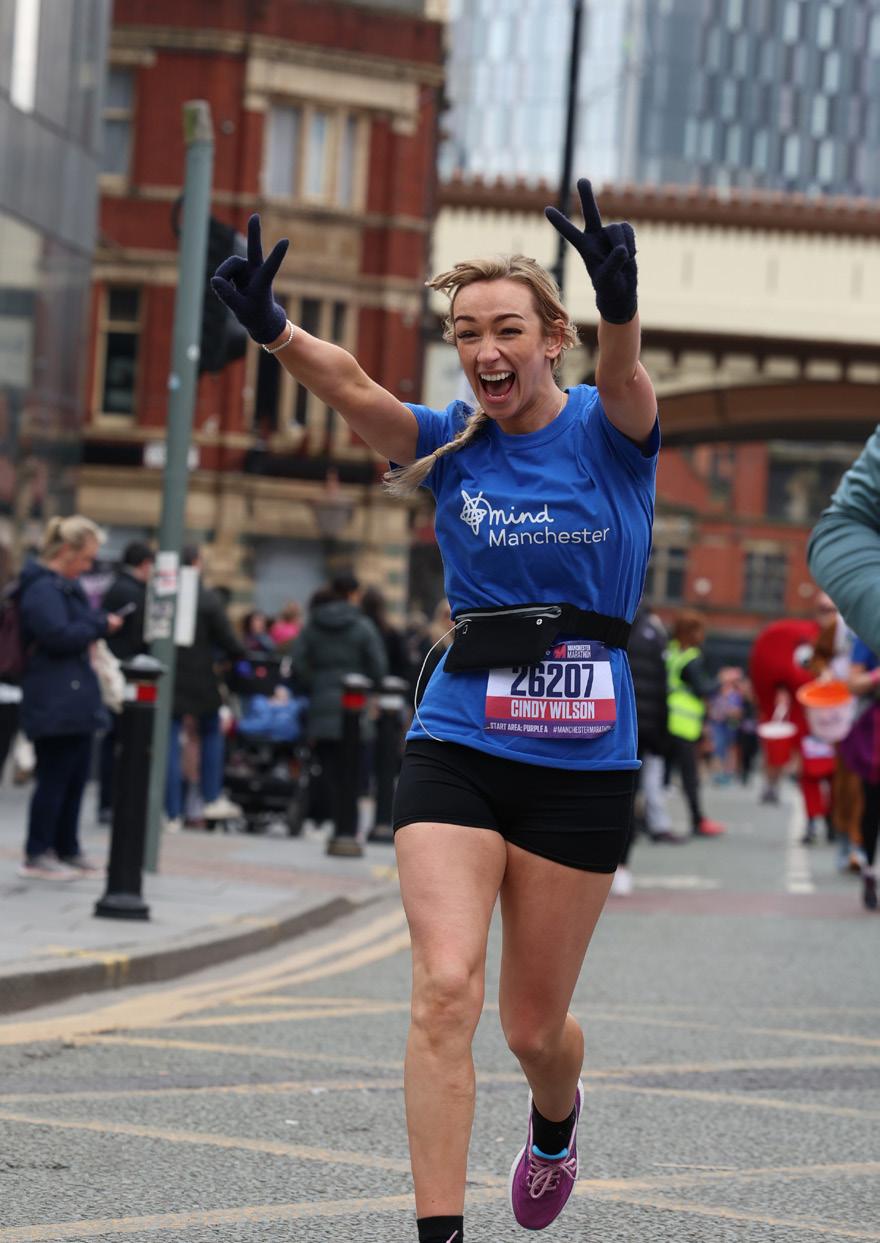
13 Annual Review 2021-22
As fundraisers set off to complete their incredible challenges, through many simple acts we build a positive relationship, and this connection provides the motivation to keep going, with a deep sense of solidarity and pride as the finish line approaches.
Marketing and Communications
…From panic stations to posters for passengers…
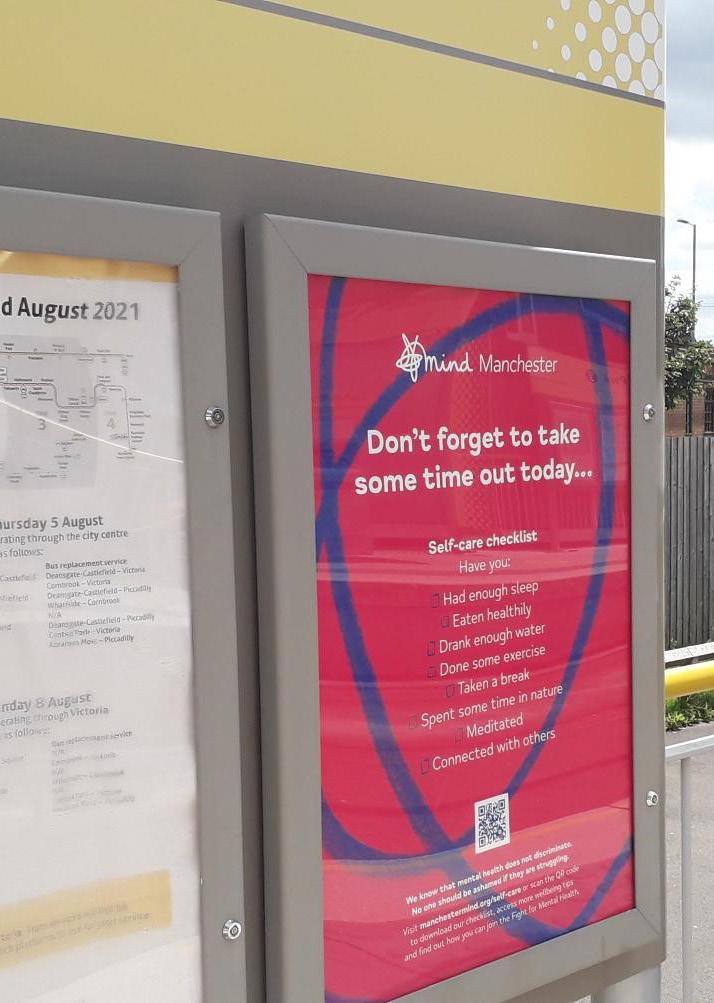
In 2019, we were approached by Transport for Greater Manchester (TfGM), the body that coordinate transport services across the region, to become our charity partner. Their plan was to run events to fundraise for Manchester Mind. Due the pandemic these plans never left the station . In April 2020, we had an online meeting to discuss the opportunity to use unsold advertising space on the tram network at a highly discounted rate.
This all sounded fantastic but as the trams travel across Greater Manchester we needed to refine an appropriate message, which would not cross paths with any other local Mind. So service and fundraising messages were out.
It was panic stations but once this subsided and the decision to move forward was made, a flash of inspiration stopped us in our tracks . During our journey through the pandemic we had been sharing wellbeing information on our website and social media. What if we were to gather this information in one location to create an online wellbeing hub? Even better what if the messaging of the campaign focused on snappy headlines and a self-care checklist as a way to get people on-board and encourage them to go online? Our posters with links to how to look after your mental health would be up on most of the tram networks!
Annual Review 2021-22 14
Turnaround ended up being incredibly speedy as some unsold space in their advertising schedule quickly appeared. What was meant to be a four-week long campaign ended up being much longer. The timing was perfect as it landed as we finally came out of lockdown and people were returning to work. The posters also remained in place throughout the summer holidays, and amazingly TfGM put them up again in October for a few more weeks.

The results by far and away exceeded our expectations, with the posters driving a huge amount of traffic to our website (nearly 18,000 page views to the wellbeing hub from July 2021 to end March 2022). Having a hidden landing page meant we could see that the posters were generating many of those online journeys . But what was even more reassuring was all the people sharing the wellbeing hub digitally and giving their thoughts and feedback about it with us.
This was really exciting for us and better still that the new Mind brand could be utilised to perfection.
15 Annual Review 2020-21
“I wanted to give some positive feedback on a poster I saw in Manchester’s Deansgate Metrolink Station. An 8 item mental health checklist, succinct and powerful gamification of wellbeing. Really appreciated it and I’m certain many others will too.”
Children and Young People’s Service (CYP)
Our Children and Young People’s Service offers a mix of counselling, mental health support in schools, peer support and advice. That combination makes a difference.
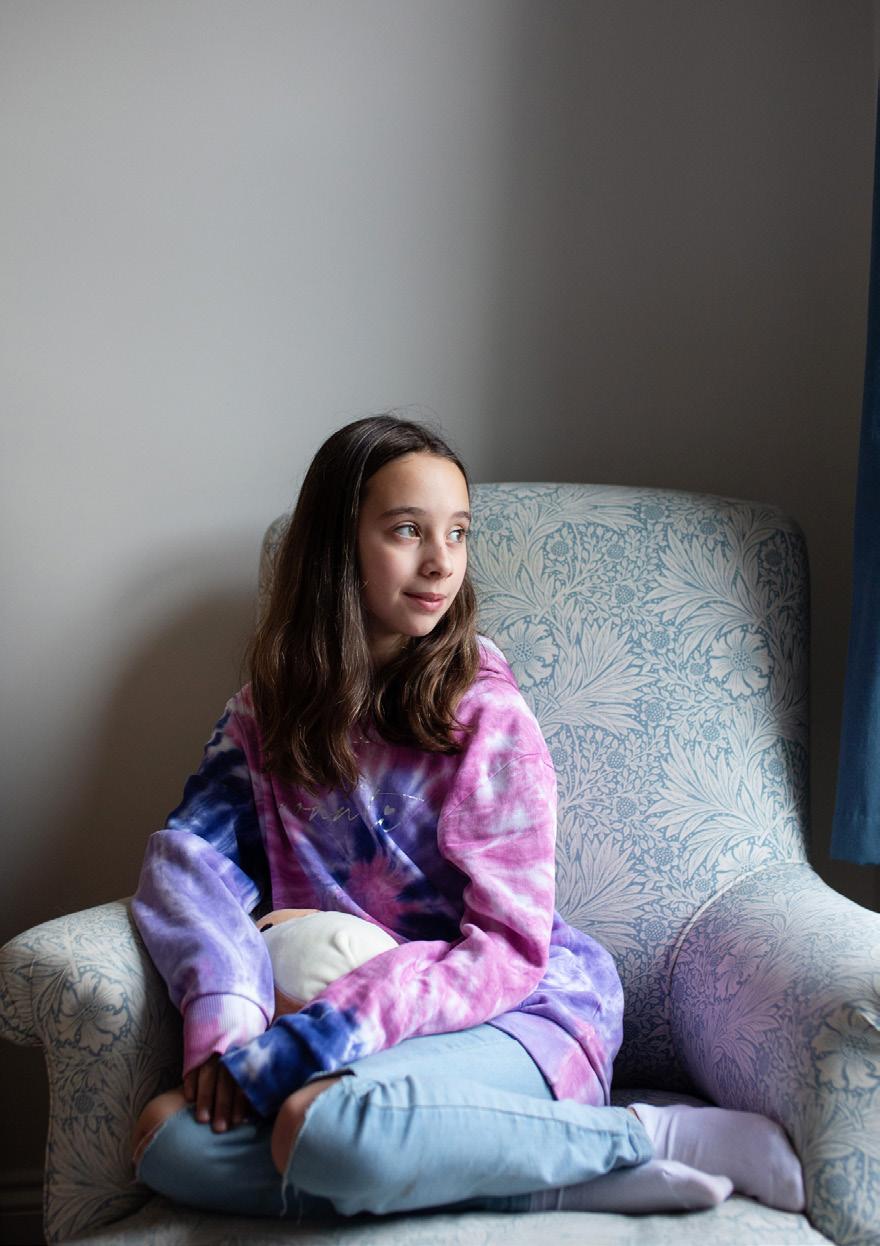
During this year we expanded our counselling model to enable volunteer counsellors and those needing a placement to support our part-time counselling staff to offer 892 counselling sessions. We have also offered our volunteer counsellors support and training to make their time with us a positive experience. The psycho-social model of Manchester Mind is seen as “an important and unique part of the service” and counsellors have valued being able to recommend other services, to the young people who they are working with, such as peer support.
Our work as part of Thrive in schools also expanded this year and we delivered 1282 one-to-one sessions, with young people in 6 schools across Manchester.
16 Annual Review 2020-21
Being able to offer support close to where young people are has made a difference.
Year 11 student

Young people have also said “the best thing is the approach. No judgement” and “the notion of personalisation”. This is probably best reflected by one person who said “I’ve spent a very long time trying to figure myself out and understand why I’m making the decisions I am, and to change things, but failing. For the first time in many years I feel like in a place where I’m comfortable with myself”. Young person accessing counselling
Sometimes when people come to us they are in a bad place as one young person told us “when I started counselling my headspace was a bad place and I tried to end my life a few times, but with some support I have managed to overcome some of my old habits and trying to make a better life for myself”.
17 Annual Review 2021-22
“It took a few weeks for me to open up with the School Mental Health Practitioner (MHP), but I began to trust her. This was because they were patient and friendly, I felt like she actually wanted to get to know me. I liked how the MHP would remember little things about what I’d said in previous sessions. This helped me to realise I was making progress and showed me my anger was getting better”
Peer Support
Peer Support has been an increasingly important service across our adult and young people’s services. It is a way of ensuring that lived experience is valued and can be used to support others. Our groups during this period have gone from strength to strength with 136 sessions being delivered over the course of the year.
Anne Marie describes her experience
This is my story.
“I have suffered with my mental health for years. Things came to a head in early 2020, when after a long period of depression, I took an overdose of my antidepressants. I ended up being sectioned for 5.5 weeks on a mental health unit where I was subject to physical and mental abuse and neglect from the staff.
I have recently been diagnosed with PTSD as a result of my experiences whilst sectioned, I have also recently been diagnosed with Bipolar – which explains a lot!
I have reached out for support in the past and have completed Cognitive Behavioural Therapy (CBT) and 5 sessions of talking therapy, which did appear to help at the time, but I found myself desperate for help whilst having a manic episode in February this year and I reached out to Manchester Mind.
I had heard about Manchester Mind in other mental health online forums – people had shared their experiences with them, so I reached out and in June this year I began attending peer group sessions.
I only attended two sessions then I had another low Bipolar episode and I stopped attending. I was going through a really hard time but I didn’t feel confident enough to come back to the
group and my mental health spiralled. My psychiatrist increased my medications and I began to improve but I still wasn’t confident enough to return to the group. It was only after a lovely message from our group leader asking how I was and that the group were there for me that I gained enough strength to get back on my laptop and join the group again.
That was six weeks ago, and again one of the best decisions I have ever made. This group is my lifeline, a safe space where I can discuss my feelings, problems and mental health and know I will be heard with no judgements. The group has helped me through some very dark days, and I will be forever grateful.
The problems and advice shared in the group have given me tools to better my mental health – so along with my therapy tools I am becoming better at managing my mental health and feel able to reach out more when I am suffering. I believe the mental health system needs vast improvements. I have had little or no support from my local authority and this needs to change - NOW!
Manchester Mind and other charities do vital work and offer support that the mentally ill need and deserve and they should be commended”
18 Annual Review 2021-22
A poll is taken after every group and on average:
82% of participants who completed the poll commented that they had found the group they attended helpful.
11% said it was partly helpful.
“I joined the zoom peer support group and am glad I did at a bad point in my life. I have had counselling a few times over the years but it hasn’t really helped me. The hour you get at counselling, half is spent box ticking which made my anxiety worse. I left feeling worse than when I went in. The zoom group has helped me as like-minded people to talk to who know how your mental health can affect every part of your life on bad day or trigger you on good days. It’s a safe place. Talking to family and friends in the past have made me more anxious as I found out they haven’t kept what I am going through private, I felt I was just someone’s gossip. No one makes me go to the zoom group. I don’t have to always talk about my mental health, sometimes I talk about things I’ve done like gardening, etc., in the week, and 3 simple ticks at the end on feedback isn’t gruelling. I just know zoom has made me feel better after a meeting. The people are all lovely. I don’t feel judged. I can get feelings of paranoia amongst strangers but have never there. It feels like family, home for me. Each Friday I look forward to seeing and talking not a feeling of dread.”
Mood wise – people generally shifted to feeling happier at the end of the group.
For volunteers who facilitate and lead the groups almost 100% say that they have increased confidence in facilitating groups, improved their skills and improved mental health. One volunteer also told us
“…skills gained from peer support have facilitated a smooth transition into paid work. Understanding various mental health issues, how to act in a trauma informed way, and feel comfort in silence, has enable me to begin work within a paid Mental Health Support Worker role with confidence, and with the best skills possible to provide support for the service users I work with.” Peer Support Volunteer
“By joining the peer support group, I hoped to receive understanding and acceptance - which I have. I was relieved to find how relaxed the group setting is and how welcome I was made to feel. The
group have helped me feel more secure and content in my day to day life by reassuring me my concerns are valid.”

19 Annual Review 2021-22
Training
Another important aspect of what we deliver is training , including 115 free community training sessions during the year and across a wide range of different courses. Last year we had to regroup and adapt our training to put it online. This year we have grown our offer and look forward to also delivering face-to-face. For many though there is now a preference for online. Alongside our tried and tested training courses we delivered two new ones:

Mindfulness for Menopause and Mums Matter – the latter delivered in North Manchester
Building a Healthy Future – for people with long-term physical health conditions
Our Mindfulness for Stress course also continued to make an impact as Ruth our Resilience Co-ordinator says:
“When delivering resilience and mindfulness courses, you hope that you’re helping to equip the participants with skills to help them, not just for the duration of the course, but for the future too. However, it’s difficult to know once the course has finished what happens to people afterwards . One way I’ve tried to support mindfulness course graduates is to offer meditation drop-in sessions, to keep them on track with their home practice and to continue to foster a sense of community in meditation. These have been running since April 2020 and some people have been coming since they started. One attendee says: ‘Just wanted to thank you for the drop-in sessions I am finding them so helpful. They give me something to look forward to and I feel a connection
20 Annual Review 2020-21
to other people as well.’ Another, who has been attending them since the start says: ‘Thank you for all of the courses I have been on… and all of the extra sessions. You have been amazing and I have benefitted from it so much. Life feels so much better now, and I feel like I have a lifelong tool to help me through any tricky times that come. So, a really heartfelt thank you’. These unsolicited emails and small acts of thanks also really help me feel connected to the people I meet on my courses, and motivated to continue.”
We have also delivered 108 employer training courses to 1279 participants including Mental Health Awareness and Mental Health First Aid (MHFA). People have found it particularly beneficial...
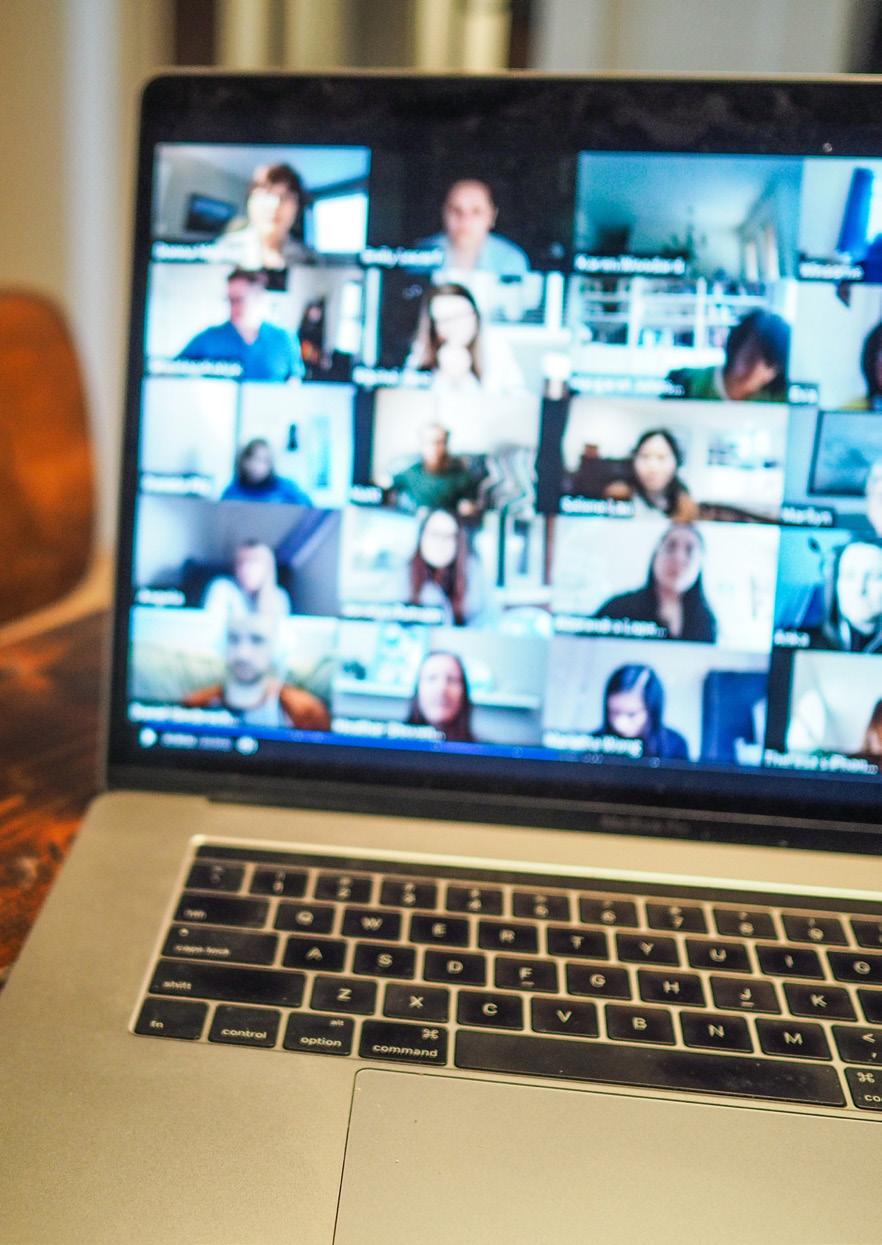
21 Annual Review 2021-22
“Hearing other stories and experiences and having a list of things to look out for and to avoid. It’s actually helpful not only for work and colleagues but for personal experiences at home so it’s been really valuable.”
Mental Health Awareness course participant
“The course provided me with strategies with which to make my health problems more bearable. The social aspect of the course was great after a year of shielding.”
Community Engagement Team
In October 2020, we had started to deliver a small service, which was focused on trialling additional support to people who were being discharged from Community Mental Health Teams . We knew from a piece of consultation carried out the previous year that some people were struggling with being left without help and therefore we built a service that focused on listening, and building trusting relationships – ensuring that we worked collaboratively to identify goals and connect people with services within their community.
By April 2021 the referrals were coming in with really positive feedback. We were finding that it really was the small stuff that makes a difference. Such as giving someone a lift……
“I supported someone called Harry. Harry lives with bad anxiety and depression, very low self-esteem and low-selfconfidence. He really struggles to leave his flat but has a keen desire to ‘do something with his life.’ He had tried a couple of anxiety groups in the past but was worried about attending them on his own and feeling like he wouldn’t be understood. I told him about the Manchester Mind allotment and the groups they run there. I explained that they’re run by people who understand mental health and who operate a safe, non-judgemental space. Harry liked the idea of this but was ‘frightened’ of going on his own. I offered to take him there for the first session so he could ease himself into it and not worry about the journey. He was surprised that I’d be able to do this and was keen to take me up on the offer.

22 Annual Review 2020-21
We attended together and Harry said he ‘felt immediately at home’ there. Harry told me ‘I would never have made it here without your help. I’m so glad I came, I’ve been feeling really low and this feels like there’s light at the end of the tunnel.’ I could tell that Harry was touched by what was, to me, a small action, but was to him a huge act of kindness which opened up his world again. He now arranges for a friend to drop him off and attends the group on his own. Recently, he reported that he “loved it there, what lovely people. So glad I went, I’ve not smiled like that for a long time, thanks for encouraging me.’
For Harry, this was a big step in helping to empower him, give him a greater sense of belonging and strength that he could achieve his goals. It demonstrated to our team the huge impact that one small act of kindness could have on someone.”
82 people during the year received this one-to-one support
331 people were supported in accessing physical health checks as part of an extension to our Community Engagement Team

23 Annual Review 2021-22
Behind the Scenes
Alongside the service delivery there is a lot of work going on behind the scenes and this was the year of finding our way back to the new hybrid way of working, but without knowing exactly how things would work out.
We had the phased return of working in the office but things did not return to how they were. Now the people who use our services were asking for different ways to engage with us, by phone, online and face-to-face. This blended delivery model meant we needed to develop new systems, policies and procedures.
It was also the year of the Mind Quality Mark audit and after a process extended due to lockdowns, we got over the finishing line. We won two awards, the Mind Excellence Award under the heading of People for our values-led approach to recruitment, and we went on to win the overall award for all categories.
We made a real investment this year in the development of our data management system, with an in-house Data Services Officer. This enabled us to make the most of our data, providing reporting for monitoring and evaluation of the services we are delivering. This has helped us deliver on our strategic aims on governance, and has given project managers an important tool for identifying areas to grow and develop.
And as a new member of the team one of the first projects our new Data Services Officer worked on was developing the system for managing the CYP Counselling team’s workload. Even with system development relationships are important. We focused on taking existing forms for referrals, assessments and counselling sessions, and linking them so that the process can be managed entirely online.
A long and involved process, Craig promised not to bore us with too many details.
“Key to it all was meeting the team in-person one morning in October, as lockdown eased. I demonstrated the pages I’d built and got immediate feedback. The team showed me where I’d misinterpreted their needs and told me about features they needed that I’d missed. Being able to learn from them directly what a Trauma Informed approach means in practice (being able to stop an assessment session and pick it up at a later date, for example) was invaluable to creating the system we ended up with.
The result of this work? 3 filing cabinets in the office are now empty because the paperwork they were filled with is now captured and stored online. The power of understanding what we all need!”

24 Annual Review 2021-22
Thank you!
We are, as always, indebted to our amazing staff team and to our volunteers who give their time to support our services. They work hard and never give up. Thank you. Our funders:
Manchester City Council
Manchester Care Commissioning Group
Greater Manchester Mental Health Trust
The National Community Lottery
Children in Need
Eric Wright Charitable Foundation
National Mind
Garfield Weston
The Houghton Dunn Charitable Trust
The Big Life Group
Barnado’s
To all the people and businesses that support Manchester Mind – getting out to run in all weathers, hold events, bake cakes, hold raffles – we salute you all. Thank you.
Finally, a thank you to everyone who comes to Manchester Mind for help and support. It is really important to ask for help, but something that isn’t always easy to do.
f

Registered Charity Number: 1102058 Registered Company Number: 4738057
/ManchesterMind l @ManchesterMind i @manchester_mind






























